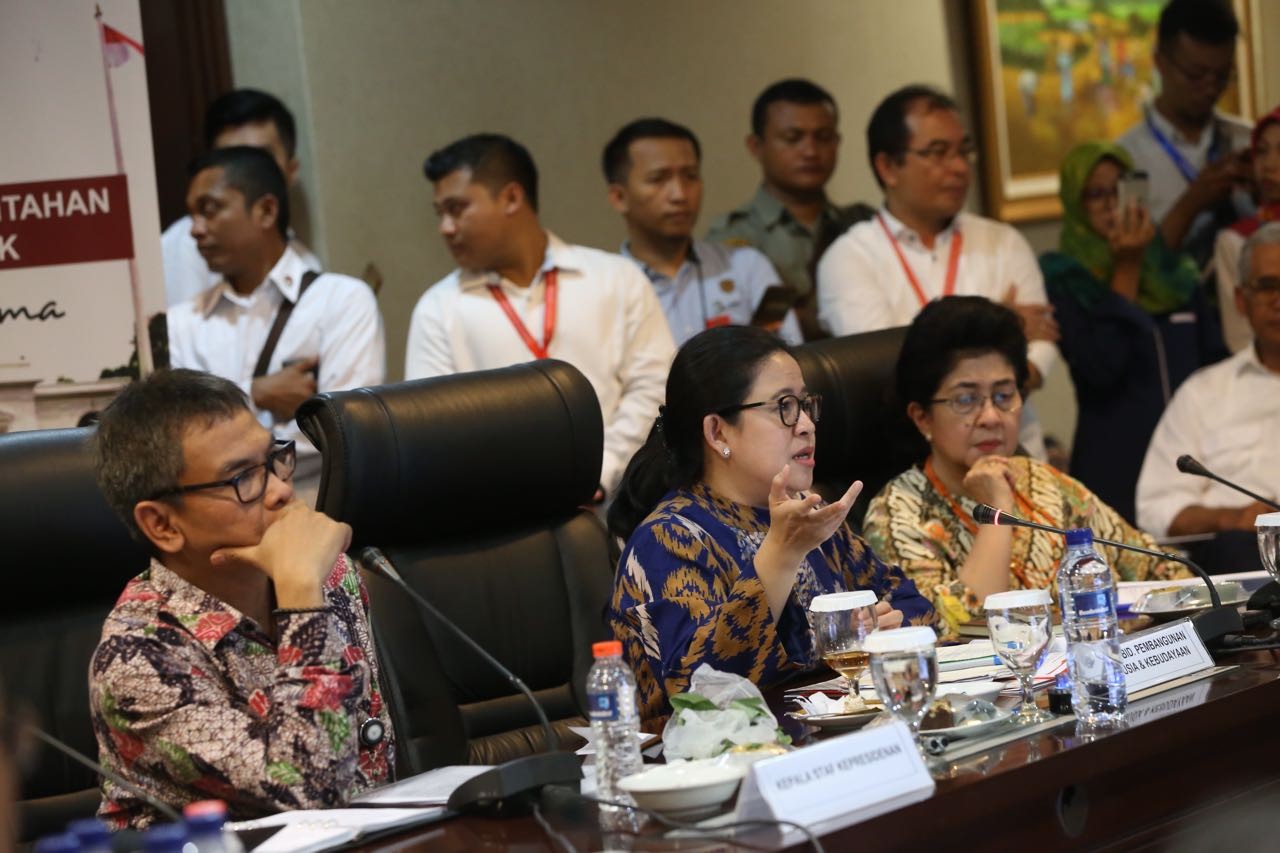Popular Reads
Top Results
Can't find what you're looking for?
View all search resultsPopular Reads
Top Results
Can't find what you're looking for?
View all search resultsGovt announces progress in human development, cultural affairs
Change text size
Gift Premium Articles
to Anyone
T
he Office of the Coordinating Human Development and Culture Minister (Kemenko PMK) has announced the quantifiable progress made within the last three years in the government’s human development and culture programs.
“On the macro level, we measure Kemenko PMK’s achievements in terms of [indicators] like the human development index [HDI], which covers many aspects including the education sector, social welfare and health, the Gini coefficient [measuring income inequality], and the government’s economic assistance program,” Coordinating Human Development and Culture Minister Puan Maharani said during an Oct. 22 press conference.
Also present at the press conference Social Affairs Minister Khofifah Indar Parawansa, Health Minister Nila F. Moeloek, Culture and Education Minister Muhadjir Effendy, Research, Technology and Higher Education Minister Mohamad Nasir, Women’s Empowerment and Child Protection Minister Yohana Yembise, Villages, Disadvantaged Regions and Transmigration Minister Eko Putro Sandjojo, Youth and Sports Minister Imam Nahrawi, and Energy and Mineral Resources Minister Ignasius Jonan.
According to Puan, Indonesia’s overall HDI had improved during the first three years under the administration of President Joko “Jokowi” Widodo and Vice President Jusuf Kalla.
Government data shows that in 2017, the Indonesian HDI increased to 0.701 (70.1 percent) from 0.689 (68.9 percent) in 2014, when the current administration was sworn into office.
Puan continued that a number of factors had contributed to the improved HDI, including the government’s education and health programs.
For example, in the education sector, the government is currently implementing the Kartu Indonesia Pintar (Indonesia Smart Card) program, which targets more than 17.9 million students across the country. The government has also renovated 67,253 classrooms in the nation’s schools, while building 1,250 new schools and 27,982 new classrooms along the way.
In the higher education sector, the government continues to implement its Bidik Misi (Targeted Mission) scholarship program for underprivileged students, with 340,000 scholarship recipients in 2017.
Aside from providing education funding, the government is undertaking reforms in the national curriculum to train its future manpower. The curriculum at vocational schools, for instance, has been changed into a demand-driven learning process to cater to industry needs.
Manpower capacity-building and certifications as well as the creation of community learning centers has also continued, with the government certifying 395,394 professional workers across various fields and setting up 22 science and technological parks this year. In terms of economic development on the village level, the government has also set up around 21,811 village-owned enterprises (BUMDes) to help rural citizens become economically independent entrepreneurs.
In the health sector, the government has certified 1,643 community health centers (Puskesmas) across the archipelago.
The government has provided rice assistance to more than 15.5 million underprivileged households while helping its citizens obtain proper housing by renovating 108,000 houses across the country.
These achievements in the education and health sectors also contribute to the improved overall livelihoods of the population, with Puan saying that the purchasing power of 40 percent of Indonesia’s poorest people had increased.
“Within the first three years of our current administration, we have been able to decrease poverty levels to 10.64 percent in 2017, from around 11.25 percent in early 2014. We have also been able to mitigate economic inequality. Our Gini coefficient has gone down to 0.393 as of March 2017, from 0.414 in September 2014,” she said.
In terms of infrastructure, the government has also established 342 child-friendly regencies and cities as of October 2017, while setting up programs to support specific societal segments, such as programs for the elderly that target 30,000 people, for street children (targeting 16,290 people) and for people with severe disabilities (targeting 22,500 people).










